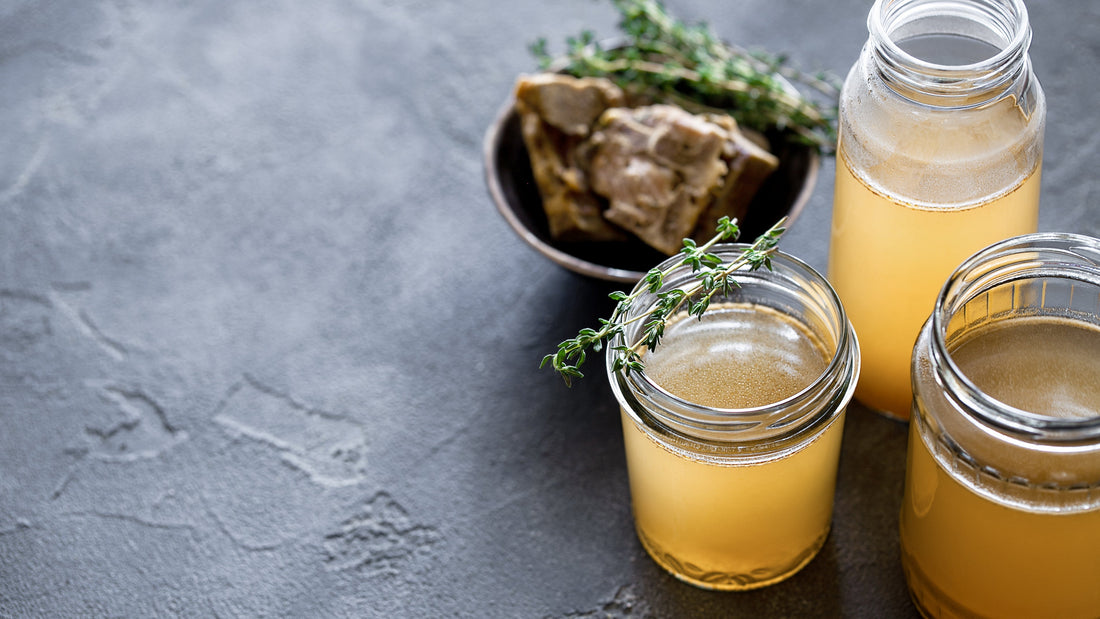
Bone Broth: What makes beef bone broth so healthy?
Share
Bone Broth (in German: beef bone broth) has experienced a veritable renaissance in recent years and is, quite literally, on everyone's lips. This soup made from gently cooked beef bones, once prescribed by our grandmothers as a miracle cure for all sorts of ailments, is now sold in high-quality preserving jars in organic markets and is enjoying increasing popularity.
But what makes grandma's home remedy so healthy? Here are four good reasons why you should also try beef bone broth.
1. Beef bone broth is an excellent source of collagen
Most people choose beef bone broth because of its high collagen content. 100ml of broth contains an average of up to 10g of collagen. Gently simmering for hours just below boiling point dissolves the collagen found in bones, cartilage, and joints. Water and continuous heat ensure that bonds in the collagen triple helix are broken down and released as Collagen peptides floating around in the cooking water. If you let the finished broth cool, it will gel. What many people don't know is that gelatin is primarily made of collagen.

At 30%, collagen is the most abundant protein in our body. As a structural protein, it provides support for bones, joints, tendons, and ligaments. Furthermore, the protein is an essential component of our connective tissue and ensures firm skin and healthy nail and hair growth.
Collagen is not essential, as our bodies can synthesize it themselves. However, sufficient amounts of the amino acids glycine, alanine, proline, and hydroxyproline are required for this to occur. Furthermore, collagen formation only works if sufficient vitamin C is available, as it supports enzymes involved in collagen synthesis. Starting at the age of 25, the body's own collagen production typically declines. Later, this manifests itself primarily in increased wrinkles, more frequent joint problems, and loss of elasticity in tendons and muscles.
2. Rich in omega-3 fatty acids
It's probably clear to everyone these days that omega-3 fatty acids are healthy. What's less well known is that beef bone broth also contains considerable amounts of these essential fatty acids. The bone marrow of grass-fed cattle, in particular, consists largely of omega-3 fatty acids. 100 grams contains 1.3 g of these essential fatty acids, which is only about 20% less than salmon, arguably the best-known source of omega-3 fatty acids.
Omega-3 fatty acids are involved in numerous metabolic processes in the body, are an essential component of our cell membranes, and ensure they remain supple. Furthermore, these fatty acids are required for the synthesis of various hormones. Omega-3 fatty acids also have anti-inflammatory effects and are said to strengthen the body's immune system.
3. Can help with digestive problems

Our female readers, in particular, will be familiar with hyaluronic acid. It has been an integral ingredient in almost all skin creams for years because it helps retain moisture in the skin. Athletes among you are most likely familiar with chondroitin sulfate or glucosamine – the main ingredients in many dietary supplements for joint and cartilage health. All three substances belong to the class of glycosaminoglycans and are found in bone marrow and joints, and are therefore particularly concentrated in beef bone broth.
Thanks to their water-binding ability, they moisturize the skin and lubricate the joints. Furthermore, they can support mucus formation in the intestines and protect them from injuries and pathogens. It is also believed that people with chronic inflammatory bowel diseases such as ulcerative colitis or Crohn's disease benefit from regular consumption.
4. Good source of minerals
However, hours of simmering not only release proteins. Vital minerals such as calcium, potassium, and magnesium also dissolve from the bones. The amount of minerals that end up in the soup depends on the quality of the bones (feeding method + animal husbandry), and the duration of the heat.
Potassium, calcium and magnesium make beef bone broth particularly interesting for athletes or people with IBD (chronic inflammatory bowel disease), who have an increased need for electrolytes or have difficulty absorbing minerals due to chronic diarrhea.
Although there are now numerous ready-made beef bone broths on the market, beef bone broth can and should be made at home if possible. To maintain proper nutrient concentrations, the broth should simmer for at least a day. Unfortunately, many ready-made bone broths are cooked for less than 24 hours. If the product doesn't set after cooling, this is often the first indication of low collagen and nutrient content.

If long cooking is too time-consuming for you, you will find carnivoro Shop with the beef bone broth A quick, nutrient-rich alternative. The beef bones from grass-fed, pasture-raised cattle (mainly ribs, marrow, and leg bones) are simmered in filtered water for 72 hours and then gently dehydrated. This ensures that our organic beef bone powder retains the highest possible mineral concentration. And with over 50 10g servings per pack, our bone broth is also a winner in terms of value for money.
